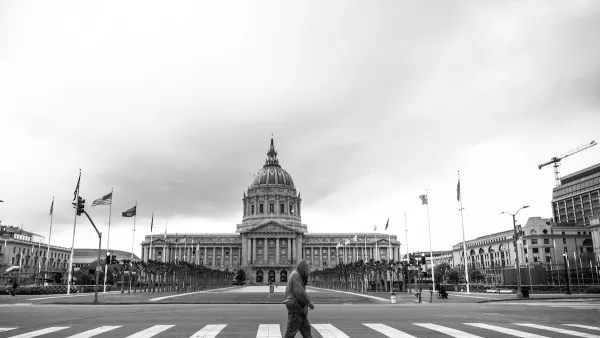Some call it a city of neighborhoods. This piece from the San Francisco Chronicle looks at the history of the urban form of San Francisco and why it looks the way it does today.
By official count there are either 40 or 48 neighborhoods in San Francisco, depending on who you ask. Unofficially, there are many more, and there always have been.
"The pioneers always had big plans for San Francisco - but it turned out to be a city of neighborhoods built around a downtown core. There were four reasons for this: geography, changing housing patterns, transit lines and disasters like the 1906 earthquake and fire.
San Francisco was laid out in a grid pattern imposed on a city of hills built on the end of a peninsula. This meant the city had a small area, but the grid pattern of the streets and the hills meant portions of the city were divided from each other, in separate little valleys."
FULL STORY: Growth of city neighborhoods

Planetizen Federal Action Tracker
A weekly monitor of how Trump’s orders and actions are impacting planners and planning in America.

Chicago’s Ghost Rails
Just beneath the surface of the modern city lie the remnants of its expansive early 20th-century streetcar system.

Amtrak Cutting Jobs, Funding to High-Speed Rail
The agency plans to cut 10 percent of its workforce and has confirmed it will not fund new high-speed rail projects.

Ohio Forces Data Centers to Prepay for Power
Utilities are calling on states to hold data center operators responsible for new energy demands to prevent leaving consumers on the hook for their bills.

MARTA CEO Steps Down Amid Citizenship Concerns
MARTA’s board announced Thursday that its chief, who is from Canada, is resigning due to questions about his immigration status.

Silicon Valley ‘Bike Superhighway’ Awarded $14M State Grant
A Caltrans grant brings the 10-mile Central Bikeway project connecting Santa Clara and East San Jose closer to fruition.
Urban Design for Planners 1: Software Tools
This six-course series explores essential urban design concepts using open source software and equips planners with the tools they need to participate fully in the urban design process.
Planning for Universal Design
Learn the tools for implementing Universal Design in planning regulations.
Caltrans
City of Fort Worth
Mpact (founded as Rail~Volution)
City of Camden Redevelopment Agency
City of Astoria
City of Portland
City of Laramie



























